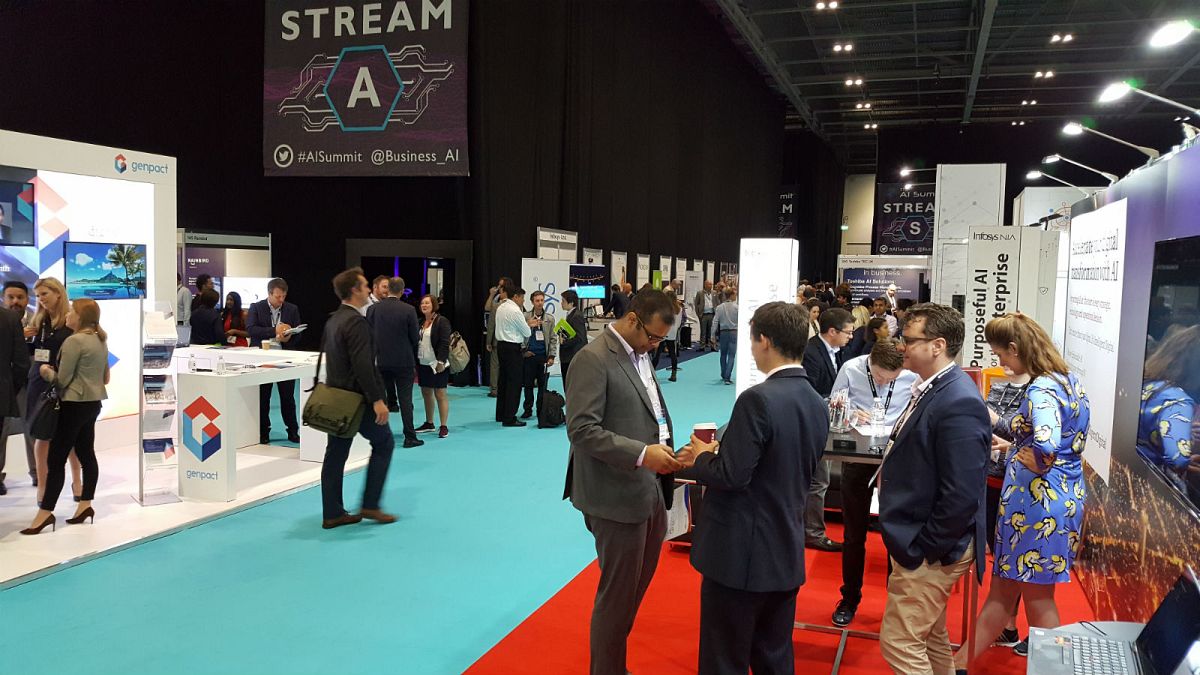AI-powered customer service agents, and robot colleagues. If it all sounds like science fiction, it isn't. Euronews' Jeremy Wilks was at the AI Summit, part of London Tech Week, to find out more.
How AI is becoming part of the world of work
Can you imagine sharing your workspace with a little robot? Chatting freely with an AI-powered customer service agent? Or using AI tools to boost profit at your own little startup? Those are some of the visions of an artificial intelligence-powered reality being discussed at The AI Summit in London.
Part of London Tech Week, the conference brings together 3,500 delegates and 400 speakers to explore what AI means for the world of business.
The event is focused on near-term developments in AI, and real-world examples of how the vast amounts of data now available in our digitized world are being exploited to boost a company's bottom line.
We discuss some of the key trends emerging from AI Summit 2018.
You're now speaking to a chatbot
Something extraordinary is happening to customer service. It's becoming increasingly common for common queries from real people to be treated by so-called 'chatbots', a type of software that carefully mimics real conversations. Computers that talk have been around for a long time, but it has taken advances in AI to create 'bots' that can have a natural conversation.
Progress has been so rapid though, that one of the newest trends is actually in slowing down chatbots, rather than speeding them up. Euronews met up with Sharif Mityas from TGI Fridays, the American restaurant chain which has become a champion of AI. "When we were testing this, a lot of folks said they didn't know they were not talking to a human," he reveals. "The only thing that tipped them off was the responses came so fast." The answer was to insert a delay in the answer from the AI, which has already understood what you wanted to say, in order to keep it 'human'.
Sanjay Srivastava, an expert in customer-AI relations analysis at Genpact, backed up that assertion, telling Euronews that natural pauses in conversation, what he calls "the 'ums' and the 'ers'", are "starting to make these technologies much more human-like."
That issue is also faced by airline KLM, which has also artificially slowed its response rates. The firm's Martine van der Lee has rolled out a huge range of chatbots across Messenger and Twitter, but stressed in her interview with Euronews that humans always check the message before it's sent, even if great efficiencies can be gained by bringing machines into the customer service mix.
Meet your new colleague, the cobot
Cobots are small, flexible robots that sit next to you in the office, workshop or lab and carry out repetitive tasks, like moving containers from one place to another, while you do the tricky tasks that you are trained to do. The idea is this new breed of robot is lighter, smaller, easier to deploy and re-train, and better suited to the personalization requirements of SMEs making specialized products.
A leader in the sector, Denmark's Universal Robotics, was showcasing its devices, which can be easily taught to weld or carry out repetitive tasks like screwing together furniture or pipetting samples in labs. It sees growth in SMEs in Europe, especially those facing a shortage of skilled manual labourers, such as welders.
The AI global gig-economy
Getting a job isn't about where you are anymore, but what you can do, and what you can learn to do. CloudFactory founder Mark Sears, who has created what he describes as a 'workforce in the cloud to help train up AI' explained to Euronews how he is recruiting staff in Nepal and Kenya to do important data tagging and classification work for customers in western Europe and North America. "Talent is distributed equally around the world, and opportunity is not," he says, stressing that he aims to pay higher-than-local wages to encourage the best candidates to be part of his vision of a global 'gig' economy, fueled by a need to generate high-quality data for AI machine learning systems.
A different approach is being developed by India's Infosys. The firm's Sudhir Jha explained to Euronews that, after trying the model of offshore workers and on-site specialists attending to a customer's needs, they were now working on 'nearshoring'. "The client might be in Palo Alto: Palo Alto is very expensive, but if you go 100 miles from Palo Alto you can find a place that's slightly cheaper, there are universities there, you can train the employees, they're close enough to the client but they're not in the very expensive centres," he explains.
What do all recruiters look for in the age of AI? Not necessarily mathematics, physics or computer science, comes the answer. "I think the biggest skill that is going to be required going forward is how quickly you can learn on your own," says Jha. Being multidisciplinary is also an asset that he says many firms will prize in a world of specialized, so-called 'narrow AIs' that are capable of doing certain tasks much faster than humans, but can't assimilate many ideas into global concepts.
AI and SMEs
It's clear that AI is becoming an important part of many businesses, but there is much more potential for growth in this sector.
Euronews met Matt Armstrong-Barnes from Hewlett Packard Enterprise, and asked him how SMEs should approach the technology. His answer was that AI won't change your business or your business model, but can be used in smart, narrow ways to get new value out of the data your company already has, about its customers, its workflows and its bottom line. For many business leaders here at the AI summit, it's that last point that really matters.


